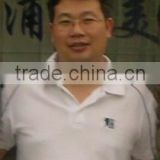Stable corrosion multipurpose GRP rebar
USD $2.5 - $4.5 /Meter
Min.Order:3000 Meters
Quick Details View All >
Zhongshan Pulwell Composites Co., Ltd.
Corrosion-resistant fiberglass deformed rebar, rebar stirrups, frp rebar
various sizes and various shapes of Basalt fiber rebar bends
Corrosion-resistant glass fiber rebar, FRP rebar, composite rebars
Corrosion-resistant composite rebar, fiberglass rebar, basalt fiber rebar
High modulus basalt fiber rebar, composite rebar, continuous rebar
Product Details
Stable corrosion multipurpose GRP rebar
About GRP rebar
What are the characteristics of GRP rebar ?
Product Application
| Item | Steel | GFRP rebar | Basalt rebar(BFRP) | |
| Tensile strength(MPa) | 350-650 | 500-900 | 700-1300 | |
| Yield strength(MPa) | 280-420 | - | - | |
| Compressive strength(MPa) | 350-650 | 400-550 | 450-550 | |
| Tensile elastic modulus(GPa) | 200 | 35-45 | 55-75 | |
| Coeffcient of thermal(× 10 -6/℃) | Lengthwise | 11.7 | 6-7 | 6-7 |
| Transverse | 11.7 | 21-23 | 21-22 | |
Company Profile
Our products include: Composite Rebars & Rock Bolts,CFRP Strengthening Strips,Stiffener Rods & Bars,Insulator Rods & Cross-arms, Nursery Stakes,Fence Posts, Driveway Markers,Fiberglass Handles & Poles,Pre-preg Roll-wrapped Tubes,Curtain Pull Wands, Roman Blind Rods & Bottom Weight Bars, as well as pultruded structural profiles, and custom fabrication.
At Pulwell, we pride ourselves on exceptional service. Behind our quality products, you will find a team of dedicated professionals.
These are our Advanced machinery and technology.
Every product needs to undergo a rigorous experimental testing!
Quality requirement is commitment to customers!
How to Contact Us?
Send your Inquiry Details in the Below for free sample
Click"Send" NOW !
The goods you have purchased will be safe and fast arrival
FAQ
Question 1 : What is Pultrusion?
Answer : Pultrusion is a continuous low pressured molding process using fiber reinforcements and thermosetting resins matrices. The fiber reinforcements are drawn through resin bath or injected with resin in which all fibers are thoroughly impregnated with the liquid resin system. The wet-out fiber is formed to the desired geometric shape and pulled into a heated steel die. Once inside the die, the resin cure is initiated by controlling at precise elevated temperatures. The composite laminate solidifies in the exact cavity shape of the die, as it is continuously "pulled" by the Pultrusion machine, thus getting the name - Pultrusion.
Question 2 : Can any shape be pultruded?
Answer : Virtually any constant cross section can be pultruded dependant upon wall thickness and complexity of the cross section of the profile.
Question 3 : What are the most typical resins used in the Pultrusion process?
Answer : Most commonly utilized are standard thermosetting resins such as polyesters, vinyl esters, epoxies, phenolics and urethanes during the pultrusion manufacturing process. However, thermoplastic resins can also be utilized in the Pultrusion process.
Question 4 : What are the most typical reinforcements used in the Pultrusion process?
Answer : Typical reinforcements used are fiberglass roving, continuous strand mat, woven and stitched fabrics. Other reinforcing materials such as basalt fiber, carbon and aramid fibers, which are more costly, can be utilized during the Pultrusion process to increase the modulus / stiffness of the composite member.
Contact Supplier

You May Like




New Products
Popular Searches
Recommended Products
Find Similar Products By Category